Programa Piloto Territorios Productivos – Guía de Campo 4. Organización con la comunidad con transferencia de recursos
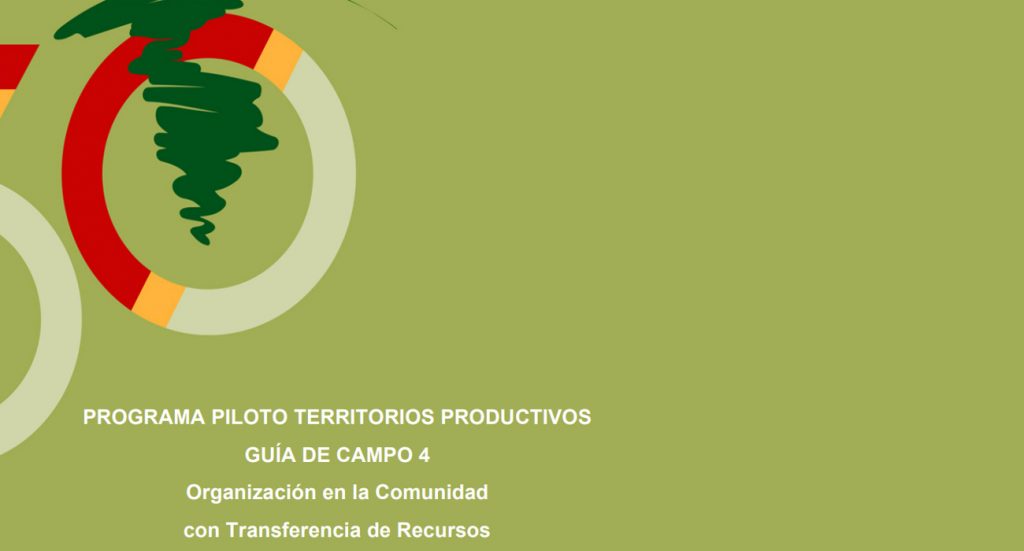
Facebook Instagram Twitter Youtube Linkedin Autores Julio Berdegué Gerardo Franco Gustavo Gordillo Celeste Molina Héctor Robles Isidro Soloaga Antonio Yúnez Naude El Programa Piloto Territorios Productivos (PPTP) es una iniciativa del gobierno federal que lleva acabo PROSPERA, y está orientada a generar experiencias y aprendizajes sobre cómo implementarla estrategia de inclusión productiva que forma parte […]
Programa Piloto Territorios Productivos – Guía de Campo 4. Organización con la comunidad con transferencia de recursos

El Programa Piloto Territorios Productivos (PPTP) es una iniciativa del gobierno federal que lleva a
cabo PROSPERA, y está orientada a generar experiencias y aprendizajes sobre cómo implementar la estrategia de inclusión productiva que forma parte de la política social de nueva generación.
Programa Piloto Territorios Productivos – Guía de Campo 3. Organización con la comunidad
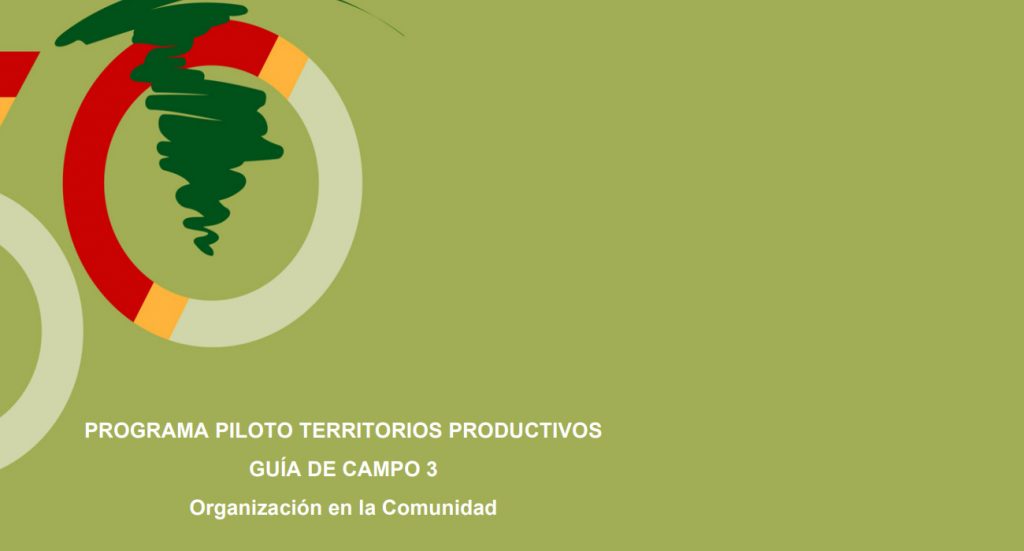
El Programa Piloto Territorios Productivos (PPTP) es una iniciativa del gobierno federal que lleva a
cabo PROSPERA, y está orientada a generar experiencias y aprendizajes sobre cómo implementar
la estrategia de inclusión productiva que forma parte de la política social de nueva generación.
Programa Piloto Territorios Productivos – Guía de Campo 3. Organización con la comunidad

Facebook Instagram Twitter Youtube Linkedin Autores Julio Berdegué Gerardo Franco Gustavo Gordillo Celeste Molina Héctor Robles Isidro Soloaga Antonio Yúnez Naude El Programa Piloto Territorios Productivos (PPTP) es una iniciativa del gobierno federal que lleva acabo PROSPERA, y está orientada a generar experiencias y aprendizajes sobre cómo implementarla estrategia de inclusión productiva que forma parte […]
Metodología para la elaboración de una herramienta o instrumento de verificación del nivel de incorporación de los estándares de calidad (innovaciones y fortalecimiento del componente rural y regional) en los POT
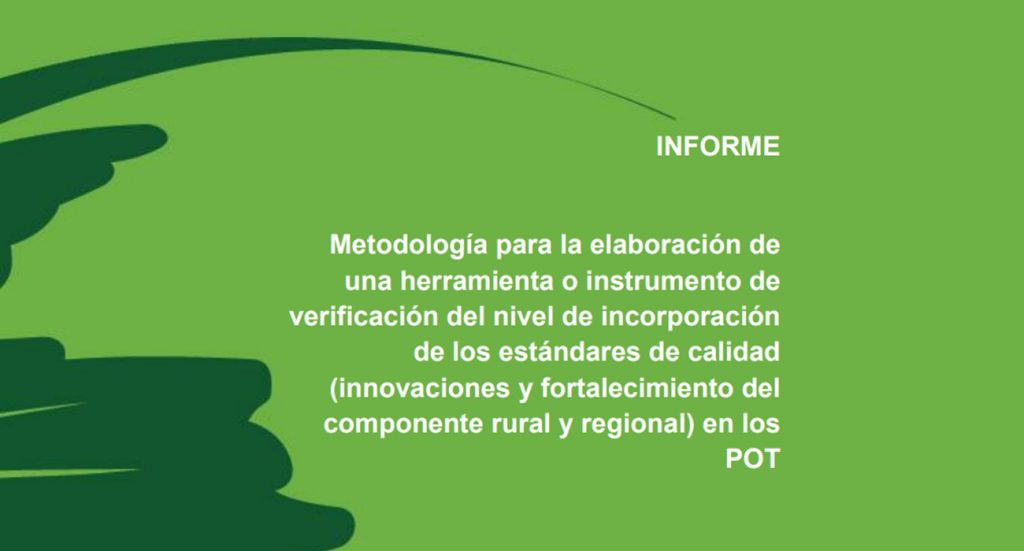
Facebook Instagram Twitter Youtube Linkedin Autores Augusto Pinto Martha Rincón Natalie Ceballos Juan Quiñones León Espinosa Duvan Quilindo Milena Umaña El presente documento contiene la propuesta conceptual y metodológica para la elaboración ypuesta y en marcha de una herramienta que permita verificar el grado de modernidad de lasegunda generación de planes de ordenamiento territorial (POT) […]
Metodología para la elaboración de una herramienta o instrumento de verificación del nivel de incorporación de los estándares de calidad (innovaciones y fortalecimiento del componente rural y regional) en los POT

El presente documento contiene la propuesta conceptual y metodológica para la elaboración y
puesta y en marcha de una herramienta que permita verificar el grado de modernidad de la
segunda generación de planes de ordenamiento territorial (POT) y la primera generación de planes
de ordenamiento departamental (POD), a partir de la revisión de los contenidos de los documentos
asociados a los Planes y de los procesos desarrollados para su construcción.
Manual de procedimientos para el uso de las secciones cuantitativa y cualitativa de la herramienta de verificación de elementos de calidad y modernidad de los POT y POD
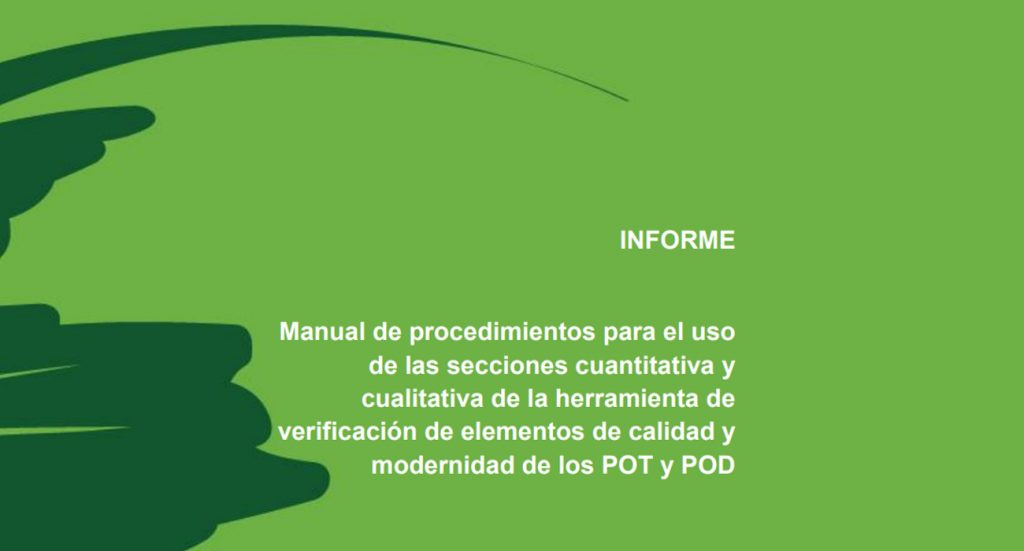
En el marco del Programa POT Modernos se determinó la necesidad de diseñar e implementar una
herramienta que le permita tanto al Departamento Nacional de Planeación – DNP, como a otros
actores locales y regionales, poder verificar el cumplimiento de estándares de calidad y
modernidad en la formulación de los Planes de Ordenamiento Territorial – POT de segunda
generación y los Planes de Ordenamiento Departamental – POD de primera generación,
especialmente, su actualización frente a las disposiciones normativas y técnicas adoptadas con
posterioridad a la Ley 388 de 1997, la cual estableció la formulación de los POT municipales y distritales, y la incorporación de innovaciones conceptuales y procedimentales.
Manual de procedimientos para el uso de las secciones cuantitativa y cualitativa de la herramienta de verificación de elementos de calidad y modernidad de los POT y POD

Facebook Instagram Twitter Youtube Linkedin Autores Augusto Pinto Martha Rincón Natalie Ceballos Juan Quiñones León Espinosa Duvan Quilindo Milena Umaña En el marco del Programa POT Modernos se determinó la necesidad de diseñar e implementar unaherramienta que le permita tanto al Departamento Nacional de Planeación – DNP, como a otrosactores locales y regionales, poder verificar […]
Aplicación herramienta de verificación de modernidad de POT y POD modernos en tres municipios de Colombia
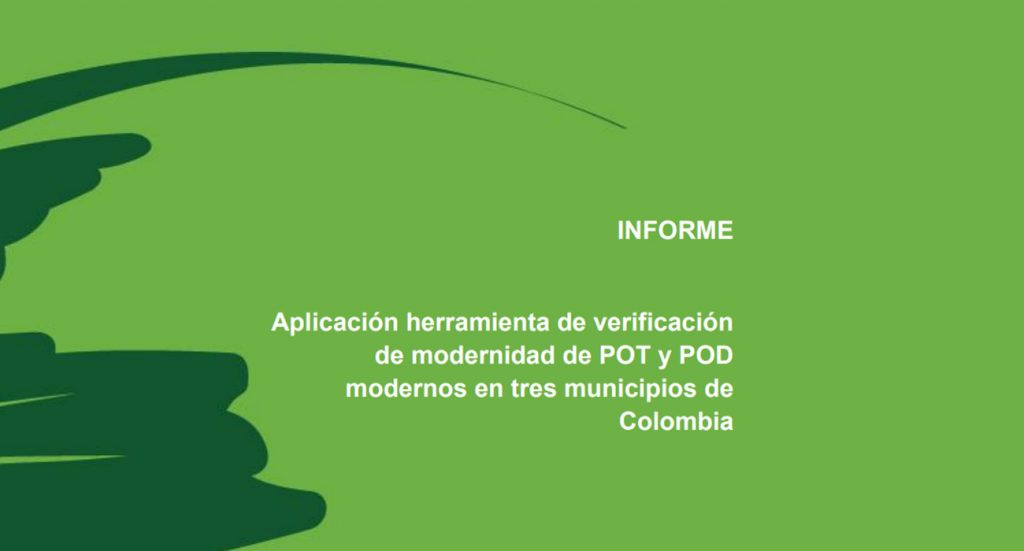
Este documento contiene la planificación de la asesoría y apoyo técnico que se le brindó al Departamento Nacional de Planeación – DNP a través del Programa POT Modernos.
Aplicación herramienta de verificación de modernidad de POT y POD modernos en tres municipios de Colombia

Facebook Instagram Twitter Youtube Linkedin Autores Pinto Augusto Rincón Martha Ceballos Natalie Quiñones Juan Espinosa León Quilindo Duvan Umaña Milena Este documento contiene la planificación de la asesoría y apoyo técnico que se le brindó al Departamento Nacional de Planeación – DNP a través del Programa POT Modernos. Descargar PDF Navegación Documentos de Trabajo Policy […]